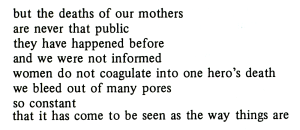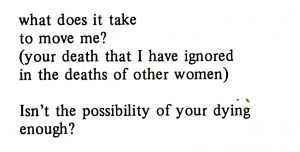Another poem by Cher’rie Moraga titled “What Does It Take?” illustrates how women who have given their lives to a cause are not remembered or celebrated the same way as men.

Gay Rights Activist Harvey Milk sitting at his desk
This poem was written “upon the death of Harvey Milk,” the openly gay San Francisco City County Supervisor who was assassinated in 1978 (Moraga Lawrence 85). His death, and his assassin’s subsequent acquittal, caused riots in the streets of San Francisco that would come to be known as the “White Night Riots” (The Official Harvey Milk Biography). Moraga is saddened by the death of Harvey Milk. She describes how his death is the death of her father, “the kind one/ pressed into newsprint” (Moraga Lawrence 89). She knows he was an important figure of the gay liberation movement, but also recognizes that if Milk was a woman, he would not have been grieved in the same public way.

Section of the poem, “What Does It Take?” by Cher’rie Moraga from the fall 1979 issue of Sinister Wisdom
Moraga explains that “the martyrs they give us/ have all been men” (Moraga Lawrence 85). The gay liberation movement was focused on gay men and sidelined gay women. Moraga points out how “the deaths of our mothers/ are never that public” (Moraga Lawrence 86). For generations, lesbian women have not been given the same recognition for similar injustices they endure. The oppression lesbian women face is not as publicized, instead “we bleed out of many pores/ so constant” (Moraga Lawrence 86). Bleeding is a quiet, painful, and perpetual injury. It symbolizes the ignored and continuous way that lesbian women are oppressed. Their oppression is no less deadly or painful than gay men’s, just quieter.

Section of the poem, “What Does It Take?” by Cher’rie Moraga from the fall 1979 issue of Sinister Wisdom
Moraga ends her poem with a call to action. She asks “what does it take/ to move me?” and “Isn’t the possibility of your dying/ enough?” (Moraga Lawrence 86). She is asking what will make the reader get up and make a change, if not the constant fear of loved ones dying? This poem recognizes the women who have fought and died for lesbian liberation and inspires the reader to fight as well. The next generation continues the fight for their liberation with the strength of the knowledge that they have mothers and grandmothers who have fought and died for this cause. Archives work to remember those grandmothers and mothers who gave their lives for the cause, because their contributions are important, powerful and inspiring to the next generation of activists.
Works Cited:
Moraga Lawrence, Cher’rie. “What Does It Take?” Sinister Wisdom, no. 11, Oct. 1979, pp. 85-86, https://jstor.org/stable/10.2307/community.28044739.
“The Official Harvey Milk Biography.” Milk Foundation, https://milkfoundation.org/about/harvey-milk-biography/. Accessed 09 November 2021.
